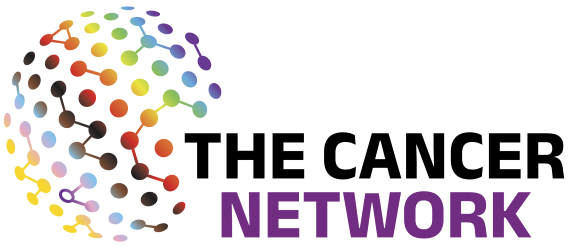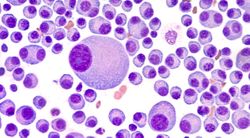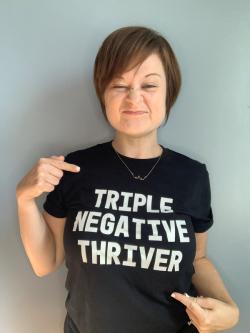- About Us
- Advertise / Support
- Editorial Board
- Contact Us
- CancerNetwork.com
- TargetedOnc.com
- OncLive.com
- OncNursingNews.com
- Terms & Conditions
- Privacy
- Do Not Sell My Information
- Washington My Health My Data
© 2025 MJH Life Sciences™ and CURE - Oncology & Cancer News for Patients & Caregivers. All rights reserved.
Progress in LGBTQ Cancer Care Over Past 2 Decades Has Been ‘Steady But Absolutely Pronounced,’ With More Advancements Needed

Brielle Benyon, Assistant Managing Editor for CURE®, has been with MJH Life Sciences since 2016. She has served as an editor on both CURE and its sister publication, Oncology Nursing News. Brielle is a graduate from The College of New Jersey. Outside of work, she enjoys spending time with family and friends, CrossFit and wishing she had the grace and confidence of her toddler-aged daughter.
The executive director of the National LGBT Cancer Network discussed the past two decades of positive change in LGBTQ cancer care and highlighted what more still needs to be done.
Just as recent decades brought a better understanding of cancer and how to treat the disease, there has also been an improvement in clinicians’ understanding of the unique issues that LGBTQ+ individuals face when it comes to the world of oncology. However, there is still much more work to be done, explained Scout, executive director of the National LGBT Cancer Network.
In light of CURE®’s 20th anniversary, Scout discussed the changes that he has seen in LGBTQ cancer care in the past 20 years, and what more he hopes to see done in the future.
CURE®: What have been some of the major positive changes you have seen in LGBTQ cancer care in the last 20 years?
Scout: There has been a steady but absolutely pronounced shift in the provider world of understanding more about LGBTQ health disparities. Just as an example, over the last couple of years, we've been awash in requests for provider trainings. And we also have so (much) more outreach from (National Cancer Institute)- designated cancer centers that are realizing that the community outreach and engagement doesn't even include our population, and how do they fix it? So there's been this real level of consciousness raising that people aren't serving our populations well, and the old adage of “we treat everybody the same,” I think there's so much more awareness that that absolutely fails for many populations.
If you're not aware of how we come to your practice with additional risks, concerns and worries, then you're not going to do a good job serving us. As an example, if there is a huge history of discrimination against our communities, the big premise of all of our cultural humility trainings is, it's on the provider to show us we’re safe; don't make us ask every single person and carry that concern and risk with every single interaction.
But at the same time, the pace of some of this acceptance is slow, it is steady. As just a different type of example, in the cancer world, the first time Biden announced the Cancer Moonshot program, it didn't have anything to do with LGBTQ people. And we had to fight to get into it. And he just re-announced the Cancer Moonshot program, and he mentioned sexual and gender minorities in his launch speech. So, there's absolutely this measured sense that people are becoming much more aware of how this affects us and that changes need to happen in order to fix it.
What more still needs to be done?
A simple measure for any practice is what are you doing to proactively show the LGBTQI communities and the overlapping racial ethnic disparity populations and other underserved populations that we’re safe? And the truth is in my town, restaurants are doing more than medical providers. Like you know, that sign that they have, all genders, all races, all, you know, immigrant status, all are welcome here. You see that up in restaurants all over the place, and I don't see anything similar to it in the provider space. And that's sad, you know, if the restaurants care more about establishing my safety, than the health care system does.
It's interesting because if I look at this long arc, you know, I was very involved in the 1993 March on Washington. And if you would have told me that in 2022, we still wouldn't have federal civil rights, I would have been really dismayed and shocked — or that in 2022, we have all these anti-trans legislative bills around the country, which we know actually affect our health negatively. Because we understand that as social exclusion. I would have been really shocked.
We know that members of the LGBTQ community may be less likely to seek health care because of prior negative experiences they may have had with clinicians. Why is it important for them to find a care team that they trust?
It's really critical to have a medical home. There's just a lot of things that we're not going to want to do ourselves, or not understand we should do, unless we have the provider badgering us to get it done. As a trans person, do, I want to go through some of my cancer screenings? Some of the screenings have to do with body parts I don't think I have. And yet my provider realizes I do and pushes me to get that done.
Similarly, we have such higher rates of smoking. And honestly, the lung cancer screening guidelines are just confusing. But if you have a medical home, your provider is an expert in remembering that stuff, so you don't have to. And it is true that many of us, because of bad experiences with providers, don't have that medical home. That’s kind of like trying to remember all the different maintenance things on your car, except we're not mechanics, and our bodies are even more important to our lives than our cars are. If you're willing to have a regular mechanic, so you don't have to worry about when your timing belt needs to be changed, why would you not have a regular health care provider? And you know, the reason is because we've had bad experiences.
But the beautiful thing about that is if we just push through to find one person we trust, then that person can be our anchor and help make sure everything else flows smoothly from there.
Where can LGBTQ patients turn to for support outside of their clinical team?
There have not been national-level, accessible support groups for queer people who are experiencing cancer or have survived it. And we're really happy that we started those last year. So, we just want all the cancer providers out there to have this as another tool in their tool belt, because the specific issues we go through and the particular challenges we face are just not things that a mainstream support group can help us with. So, you know, let's help us to support ourselves by spreading that news.
They’re free, they’re virtual and three times a week… There are a bunch of people that we want to help get through this journey.
For more news on cancer updates, research and education, don’t forget to subscribe to CURE®’s newsletters here.
Related Content:




